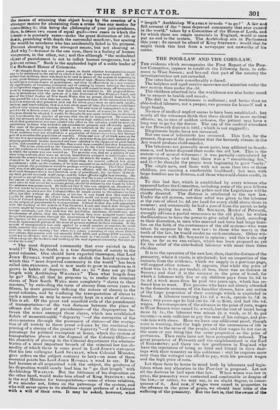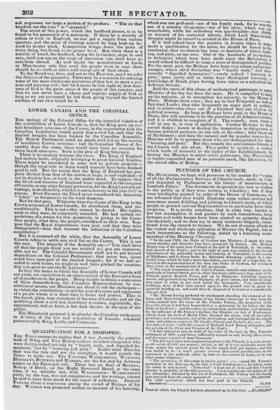THE POOR-LAW AND THE CORN - LAW.
THE evidence which accompanies the First Report of the Poor- , law Committee, appears to estal&sh the following facts, in refe- rence to West Sussex; and beyond that part of the country the investigation has not yet extended.
The rates have been considerably reduced. The helpless and aged receive morecare and attention under the new system than under the The children admitted into the workhouse are also better cared for in respect to health and tnorals.
The diet in the workhouses is sufficient ; and better than an able-bodied labourer, nut a pauper, can procure for himself and a large family.
No case of medical neglect seems to have been established ; but nearly all the witnesses think that there should be more medical officers; as, in case of sudden sickness, the patient may have a long way to go lbr the doctor. The pay of the medical attendant in the Petworth district is 100/.; which is not niggardly.
Illegitimate births have not increased.
Not one case of infanticide has occurred. This fact, for the present, disposes of the prediction that the bastardy clauses in the Act would produce child-murder.
The labourers are generally more quiet, less addicted to drunk- enness, and better disposed than under the old law. This is the statement of several witnesses : it was partially contradicted by one gentleman, alio said that there was a " smouldering fire." and that he thought the people were beginning to grow "surly."
The single men, and those with nut more than two or three children, are earning a comfortable livelihood ; but men with large families are in distress, and those who could obtain credit, in debt.
To this last fact, which is established by every witness who appeared before the Committee, including some of the poor fellows themselves, the attention of the public and the Legislature will be chiefly directed. The distress is attributed to the new law. Under the old system, out-door relief was given to the labourer at the rate of about Is. 4d. per head for every child above three in number; and occasionally he had a pound from the parish as help towards paying his rent. Mr. Soceerr, Rector of Petworth, strongly advises a partial recurrence to the old plan: lie wishes the Guardians to have the power to give relief in kind, according to their discretion, to men who married and have had large fami- lies on the faith of the continuance of the old system—who were taken by surprise by the new law : to those who marry in the teeth of the law, be would render no such assistance. Other wit- nesses concur with Mr. SoceErr in opinion; and this is the only plan, as far as we can collect, which has been proposed as yet for the relief of the able-bodied labourer with more than three children.
It is to the operation of the new law, then, that the distress of the peasantry, where it exists, is attributed; but an inspection of the extracts from the evidence, which we supply in a previous page, will suggest other causes. It appears, that while the price of wheat was 5s. to 6e. per bushel, or less, there was no distress in Sussex; and that it is the increase in the price of bread, for which a labourer with five or six children pays from 2s. 6d. to 3s. 6d. a week more than he paid two years ago, which has re- duced him to want. Few persons who have not closely attended to the domestic economy of the humbler classes, have any notion of the large propoition of their earnings which is expended in bread. A labourer receiving I Is. 6d. a week, spends es. id. in flour; two years ago he laid out 6s. 7d. in flour, and had 10s. 6d. wages. In consequence of the advance in the price of corn, wages in West Sussex were raised Is. a week, but the cost of bread bemg more by 3s., the labourer was minus 2s. a week, or 5/. 4s. per annum,—a sum sufficient to pay the rent of his cottage, and pro- vide him with shoes. Here we have one additional proof, though none is wanting, that the high price of the necessaries of life is injurious to the mass of the people, and that it ages do not rise in the same or any thing like the same proportion as the price of provisions. Then rents have not been perceptibly reduced. The great proprietor of Petworth and the neighbourhood is the Earl of EGREMONT: and there are few gentlemen in England who have the reputation of being as kind and liberal in their deal- ings with their tenantry as this nobleman : still he requires more rent than the cottager can afford to pay, with his present wages and the high price of corn.
Let these facts be borne in mind both by labourers and legis- lators when any alteration in the Poor-law is proposed. Let not all the distress be laid upon that law. When wheat was low in price, the peasantry were contented and comfortable in despite of the law,—or rather, we may say, in no slight degree, in conse- quence of it. And now, if wages were raised in proportion to the advance in the price of grain, we should hear little of the suffering of the peasantry. But the fact is, that the owner of the soil engrosses too large a portion of its produce. "The ox that treaded) out the corn" is "muzzled."
The secret of this power, which the landlord abuses, is to be found in his possession of a monopoly. If there be a scarcity of cotton or wool in England, we can get a supply from various quarters. and the price of clothing cannot be long kept up be- yond its proper mark. Competition brings down the price of every thing, but bread, to its proper level. But when there is a scarcity of bread, the landlord, being the lawmaker, steps in and says, until you are on the verge of starvation you shall have no corn from abroad. As well might the manufacturer at Leeds or Manchester rule that until the people were in rags there should be no cloth or calico sold except out of their shops. To the Bread-tax, then, and not to the Poor-law, must we refer the distress of the peasantry. There may be a necessity for relaxing some of the most wholesome provisions of that law, to meet a pre- sent and pressing evil ; but let it never be lost sight of, that dear- ness of food is the great curse of the people of this country, and that we can never have a cheap and regular supply of food as long as we are prevented by law from going beyond the limited confines of our ow n island for it.



























 Previous page
Previous page